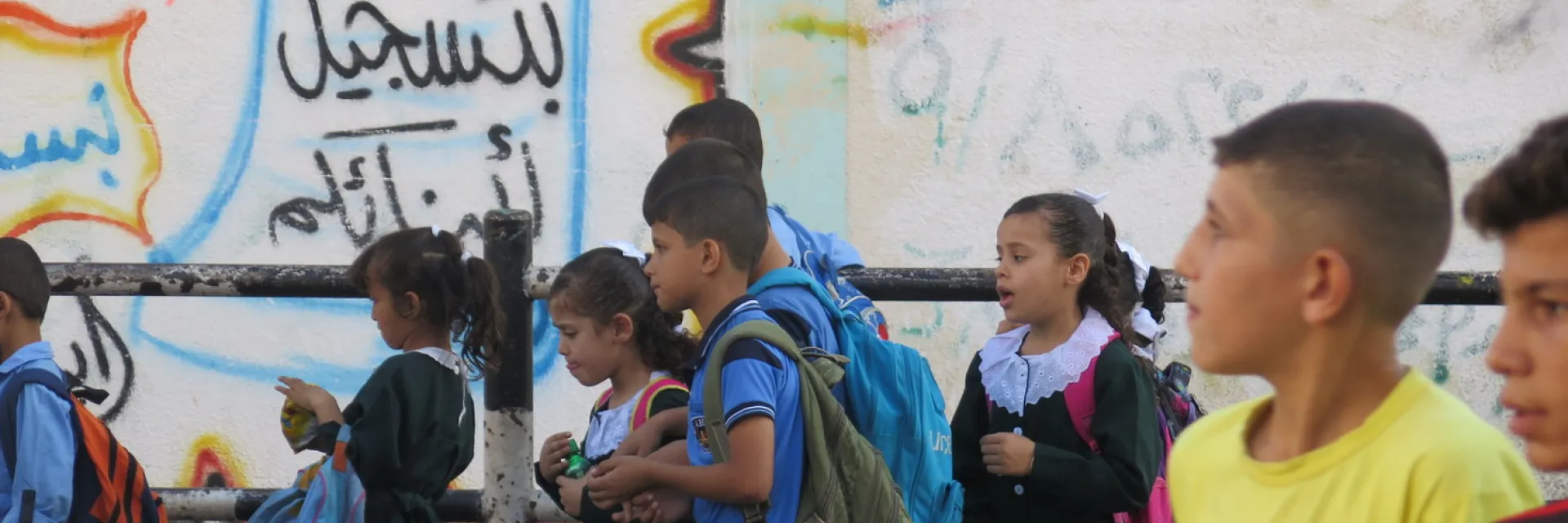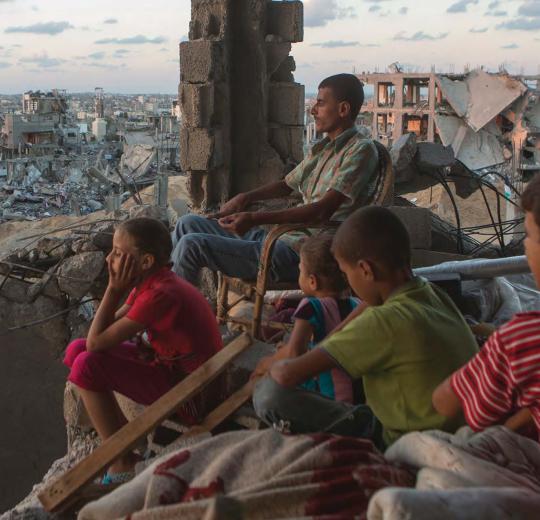A humanitarian crisis is unfolding in Gaza. Following Hamas’s October attacks, Israel’s military has killed tens of thousands of people. Nearly 2 million have been displaced. Restrictions on aid are causing starvation. The International Court of Justice says Israel’s actions may constitute genocide.
Our team in Gaza is delivering life-saving humanitarian aid as conditions allow. In the U.S., our advocacy team has mobilized people across the country for a cease-fire and for changes to realize just, sustainable peace. Please join us in supporting these efforts.
For over sixteen years, two million Palestinians in Gaza have lived under a brutal military blockade imposed by Israel.
Gaza Unlocked is a project of the American Friends Service Committee, offering analysis, stories, and background information about Gaza. The project seeks to raise awareness and provide resources for those wishing to organize in solidarity, take part in events and protests, engage elected officials, and work for an end to Israel’s blockade on Gaza.
Quick Facts
Israel's war on Gaza has devastated all aspects of life in Gaza. Stay up-to-date with the United Nations Office for the Coordination of Humanitarian Affairs' (OCHA) most recent statistics here.
- 2 million Palestinians are internally displaced in Gaza.
- Hundreds of thousands of displaced people in southern Gaza suffer from poor access to shelter, health, food, water and sanitation.
- Since October 7, 2023, over 61,000 Palestinians were killed and 151,000 were injured in Gaza by Israel.
- Nearly 12,000 children under five years in Gaza were identified to be suffering from acute malnutrition in July, the highest monthly figure recorded to date, according to the Nutrition Cluster.
- Over 70,000 housing units have been destroyed in Gaza since October 7, 2023.
- There is about 1 toilet per 850 people in Gaza.
- The latest satellite imagery shows that 86 per cent of cropland in the Gaza Strip has been damaged while most of the remaining cropland is inaccessible, leaving only 1.5 per cent of Gaza’s cropland currently accessible and not damaged.
Reported Casualties and Injuries as of 6 August 2025:

Displaced in Gaza
Read testimonies from Gazans who have been repeatedly displaced within their homeland since October 7, 2023. Displaced in Gaza aims to raise global awareness about the violent and forcible displacement inflicted upon the Palestinians, and the impact this has had on every aspect of their normal life. Every story is unique, yet the endurance of the Palestinian people remains a common thread, linking each story of hope and loss together.
Light in Gaza
AFSC's anthology, Light in Gaza: Writings Born of Fire, includes works by eleven Palestinian writers and poets, who imagine the future of Gaza beyond the cruelties of occupation and Apartheid. They imagines what the future of Gaza could be, while reaffirming the critical role of Gaza in Palestinian identity, history, and liberation.
The Blockade: Failed Policy
In 2006, Dov Weisglass, advisor to then-Israeli Prime Minister Ehud Olmert, said that restrictions on Gaza were imposed to "put the Palestinians on a diet, but not to make them die of hunger." Restrictions and blockade followed Israel’s 2005 redeployment from Gaza, as it abandoned Israeli settlement in the territory in order to implement greater control and isolate it from the rest of Palestinian territory. Israel justified increasing restrictions and blockade on the 2006 election of Hamas in Gaza. And yet after a decade and a half, it should be clear that Israeli justifications for the blockade do not stand up to scrutiny: the blockade has not weakened Hamas, brought “security,” or stopped violence. Instead, the world has witnessed four major Israeli wars on Gaza featuring massively disproportionate violence by Israel, and the transformation of the Gaza Strip into an unlivable territory.
Israel has treated Gaza as a laboratory for testing new weapons and methods of control: new technologies of surveillance, drones to spray “skunk water” and teargas, experimental explosives, “smart fences” and other forms of spatial control. Israel’s arms industry, a primary sector in its economy, then exports these technologies to other regimes around the world.
This targeting of Gaza’s population is what led the U.N. and International Committee of the Red Cross to declare the blockade an illegal form of collective punishment under international law.
The blockade must end.


